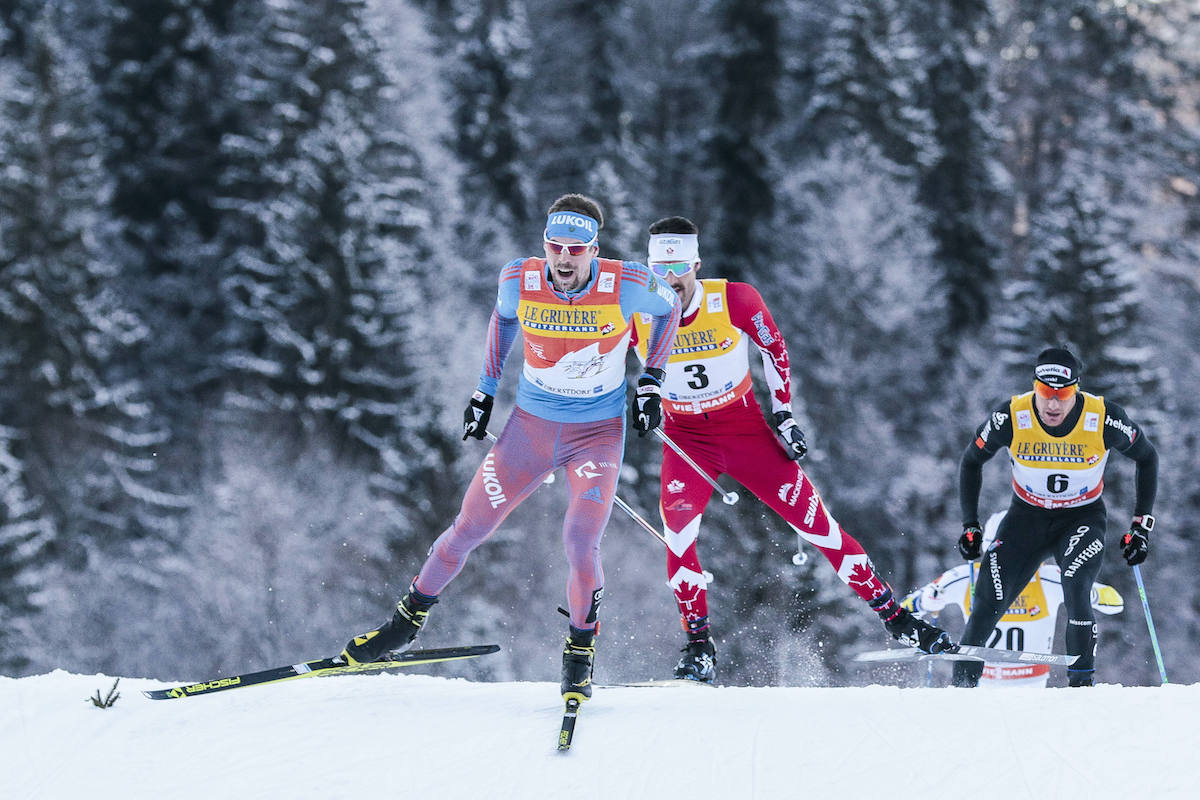
First things first: fresh snow in Central Europe. Rather than what we’ve been used to — seeing a farmed ribbon of snow snaking through an otherwise snow-free landscape — Oberstdorf, Germany, the site of Tuesday’s third and fourth stages of the Tour de Ski, looked Bavarian-alps idyllic. Snow!
Despite the new flakes, the Stage 3 men’s 20-kilometer skiathlon (10 k classic + 10 k skate) was still a dizzying affair. That had little to do with the eight total laps each skier contested around the 2.5 k race loop. There were near-constant lead changes, falls, a slinky line of skiers stretching and contracting, and some infighting involving Russia’s Sergey Ustiugov and Norway’s Martin Johnsrud Sundby making a wrong turn.
After all the tactics and drama, Ustiugov made it three victories in three stages, winning the skiathon by a toe ahead of Sundby in second (+0.6). Swiss skier Dario Cologna placed third (+1.0). Canada’s Harvey, sitting third overall coming into the stage, was fourth (+2.7). Another Canadian, Devon Kershaw skied near the front for most of the race for a World Cup season-best 10th (+7.4).
Ustiugov came into the skiathlon as the the Tour leader with a 18.9-second lead on Sundby in second overall, and a 59.6-second gap on Harvey in third. With another win, the Russian increased those margins, further tightening his Tour de Ski grip. Sundby and Harvey are still second and third in the overall Tour standings, respectively, but now sit just a bit further back. Sundby is 29.5 seconds behind Ustiugov, and Harvey is 1:09.3 minutes back heading into Wednesday’s Stage 4: a 15 k freestyle pursuit.
“It was a really hard race today,” Ustiugov said, according to a FIS press release. “I gave my best. On the last climb I felt the pace went down and I decided to attack. It was not planned. I reacted to the situation.”
For the initial classic leg Ustiugov led. But whether setting the tempo or sitting back a few places, his race was never one of fighting to gain places. When some like Sundby were starting to double pole after a downhill runout, Ustiugov could glide. His skis a value added variable to his day-to-day dominance thus far in the Tour.
Before the swap from classic to skate, others besides Ustiugov and Sundby positioned themselves in front. There were Norwegians Niklas Dyrhaug and Didrik Tønseth, Russian Alexander Bessmertnykh and Harvey all taking their turns. It was a mass-start race where no skier could pull away, only those unable to keep pace fell off.
With the classic-to-skate exchange came some tension
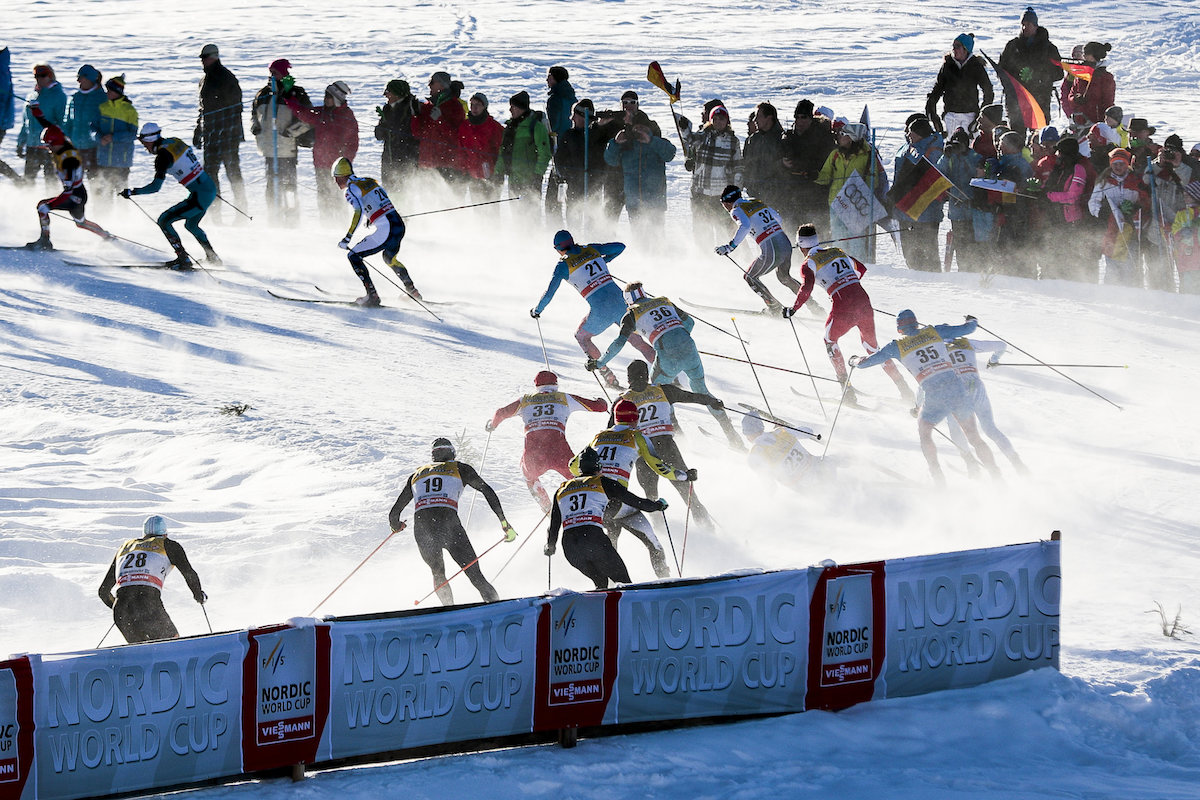
At 10.1 k, the leaderboard looked like this: Sundby in first, Finland’s Matti Heikkinen second (+0.1), Kershaw third (+0.4), Harvey fourth (+1.2), with Ustiugov sixth (+2.2). At this point, Cologna was 18th (+6.0).
Sundby then played his traditional role up front. He came through the 12.5 k time check leading Heikkinen. Kind of ho hum. But then a quick loss of focus and Sundby missed the lap lane through the stadium. Heikkinen was caught lapsing and followed, too. All that at the start of the second skate lap with 7.5 k to go.
“A lot of weird things happened,” Tønseth, who placed 25th (+27.5), told Norwegian broadcaster NRK after the race. “Martin went the wrong way and then Ustiugov ran off. I think that’s poor sportsmanship.”
What Tønseth referred to was the perception that Ustiugov upped the pace when Sundby U-turned. Even if that was the case, the Russian’s acceleration wasn’t a doomsday type increase of speed for Sundby. The overall World Cup leader kept calm despite retracing his steps, heading back on course and bumping back to 18th (+12.8) at the 12.95 k mark.
“It isn’t that much to talk about,” Sundby told NRK about his wrong turn. “Real idiot! I hadn’t gone through the course beforehand. I don’t really understand what happened. It was very unintelligible.”
Ski racing is mental. It’s clearly physical, too. Unshaken, Sundby began picking off places and time. With less than a kilometer to go, it looked as if the parallel universe in which Sundby had skied off course didn’t exist — Sundby was in front.
Ustiugov outdueled Sundby in the ensuing finishing-straight drag race.
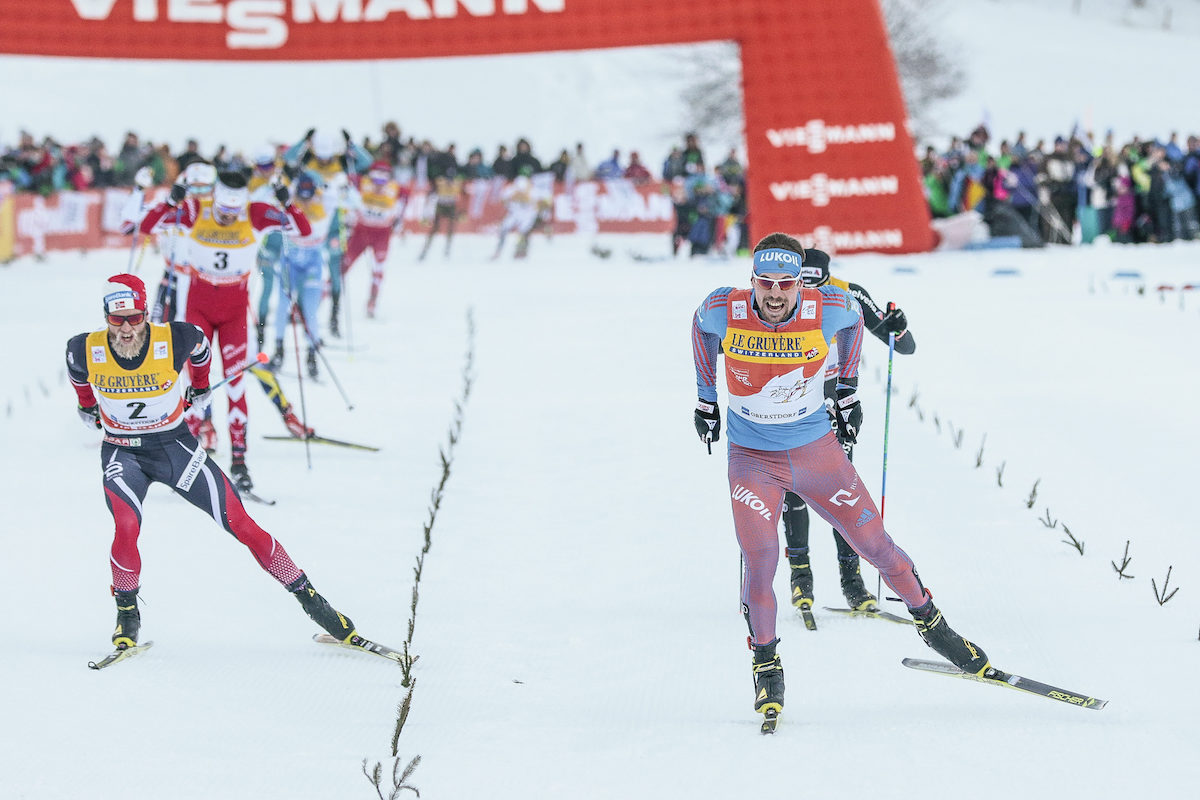
“I wish I could have won, but I’m not the best skier in the world at the moment,” Sundby said to NRK. “That’s a Russian. I was so sore that it was mostly about finishing with pride and crawling over the finish line.”
For Swiss start Cologna, being on the podium after a considerable drought was welcome.
“It was an exciting race,” Cologna told FIS. “I like skiathlon competitions in Oberstdorf and I Iike the course. I wanted to ski carefully, there were some falls and I did not want to lose the race. I was feeling really good in the free technique portion. I tried to be in a good position. In the end I could follow Martin. I am very satisfied with the third place.”
In a post-race sidenote, Tønseth’s perception of poor tactics on Ustiugov’s part may not have been Ustiugov’s only faux pas. During the race, Sweden’s Marcus Hellner could be seen jostling with Ustiugov.
NRK quoted Hellner after he spoke to Swedish broadcaster SVT. Hellner claimed Ustiugov was skiing with aggression.
“I feel like Ustiugov was throwing his poles around,” Hellner reportedly said. “It’s no big deal, but it’s frustrating when it happens … I asked him what he was doing and then he hit me with his pole again. It’s natural to be frustrated by stuff like that.”
Hellner boiled over. “I punched him back and added some well-chosen words.”
After crossing the line, Hellner could be seen having words with the winning Russian.
Maple-Leaf Duo
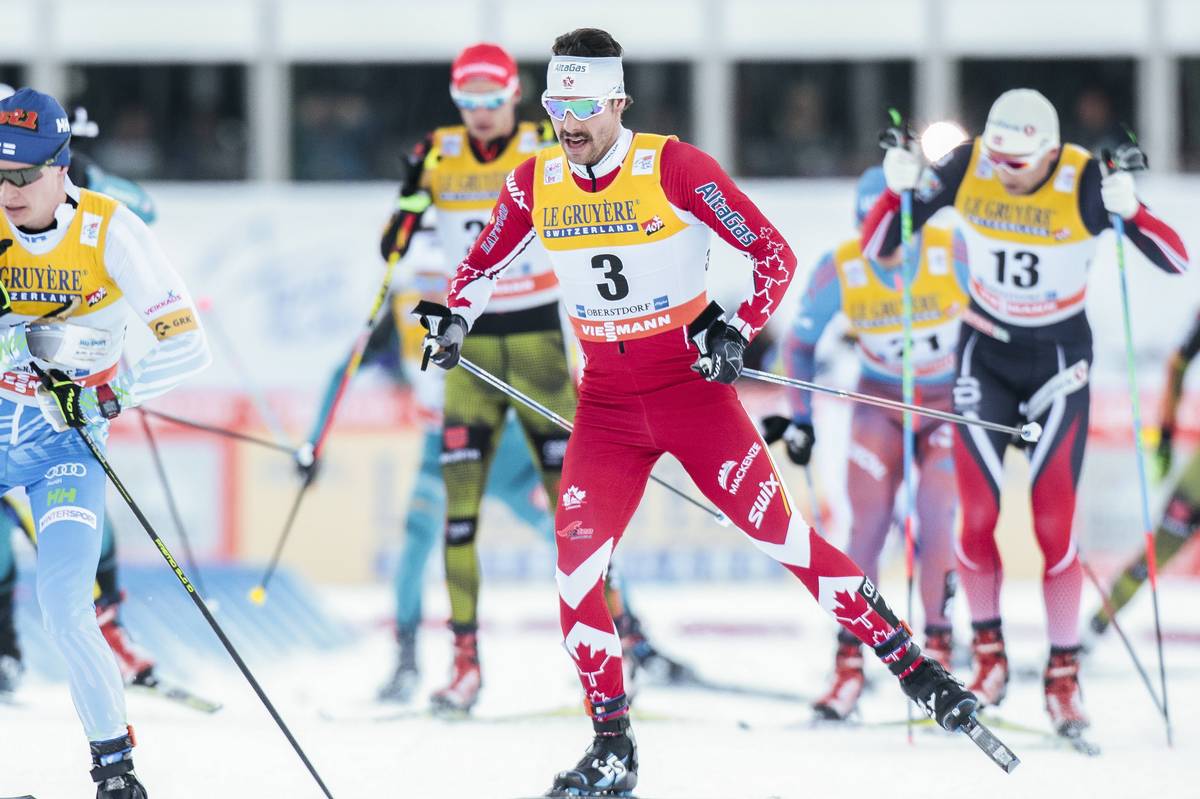
At age 28, Harvey is on pace for an overall Tour podium. It’s still early, but with three stages down and four to go he sits third overall.
“The Tour de Ski, it’s all about consistency, being close to the leaders everyday,” Canadian World Cup coach Ivan Babikov told FasterSkier on the phone. “That will set you up for the good overall [result]. Alex is happy, it’s kind of bittersweet, that we are close to podium, but not really. I think for the long run, it’s a really good race for Alex, and now he’s still third with some clearance, and some good work to do tomorrow with Dario. I think Dario is the only one that is close to him.”
For the overall, Harvey is third (+1:09), Cologna fourth (+1:25.4), while Hellner lurks in fifth (+1:42.4), and Norway’s Emil Iversen is sixth (+1:44.5).
“[Harvey] did everything right … When it’s a mass start, it’s hard to ski away from the pack. You have to be super, super strong, you have to be stronger than everybody else,” Babikov said. “Today, just the plan was to stay with the group, try and collect some bonus points, and finish on the podium or as close as possible. And that’s what he did.”
In a Cross Country Canada (CCC) press release, Harvey reiterated that his pre-race strategy was spot on.
“Things played out exactly according to plan,” Harvey said. “I had really good skis again and the body felt good. After watching the [women’s race], I knew it would be a tight race. I really thought I was going to be on the podium today, but in the end I came up a little short.
Harvey wanted both a podium and bonus seconds — time that in a seven-stage race like the Tour de Ski can pay long-term dividends.
“I knew with a tight pack I could go for the bonus seconds,” Harvey said. “I won the first sprint and was third in the second one so that gave me some extra time in the overall.”
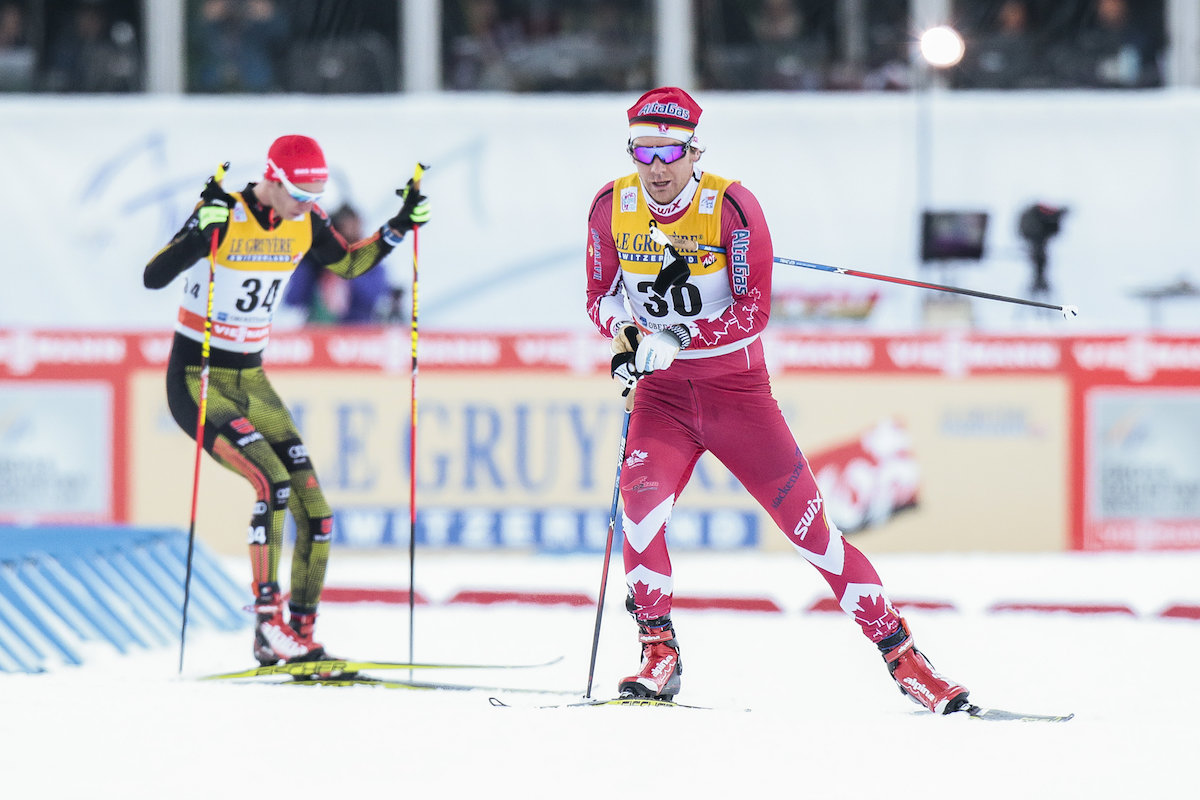
It was Harvey’s best result of the year. That was also the case for his 34-year-old teammate Kershaw.
“It was just an excellent day for me,” Kershaw told CCC. “I woke up and I felt really good. I felt amazing in the warm up and all of my classic skis I tested felt really good. I took a lot of confidence in that while climbing the steep hill, and it just continued throughout the race. The guys (wax techs) gave me excellent equipment as they have all year and I’m just incredibly satisfied. It feels that extra little bit special since it has been a while for me.”
For a time as the classic leg was closing down, Kershaw put a ten-meter gap on the field.
“That was some of the best I’ve felt in classic-skiing in my career,” he said. “I have been feeling good in classic all year. It’s weird though. I feel I have been slightly on the wrong side of things and today I was able to ski at the top and also hold my own in the skate.”
Kershaw finished fourth overall in the 2012 Tour de Ski, and his 10th place on Tuesday is his best result since the 2013/2014 season. After three stages Kershaw is 20th overall in this year’s Tour (+ 3:01.9).
Also for Canada, Len Valjas placed 37th (+2:10.6) and is 32nd overall, and Graeme Killick 50th (+3:33.7) for 48th overall.
The U.S. Ski Team has two skiers remaining in the Tour: Noah Hoffman and Erik Bjornsen. Hoffman began the day in bib 44 but will start Wednesday’s stage in bib 37 as the Tour’s 37th ranked skier.
On Tuesday, Hoffman finished 35th (+2:06.8).
“I was very encouraged with Noah’s skate energy today, and with his attitude after the race,” U.S. coach Matt Whitcomb told FasterSkier on the phone. “He said, ‘Thank God there are four stages left.’ It’s not an athlete that is ready for the Tour to be over … I really believe that tomorrow could be one of the best days of the year for Noah. It’s a very challenging skate course, and he looked good doing it today. He spent about 30 minutes skiing by himself today, he unfortunately wasn’t able to maintain contact. That cost him some time, for sure.”
Hoffman was mindful of his bump in the standings but is keeping a big perspective on the season.
“It’s more than that for me, though,” Hoffman said on the phone. “I did a lot of really high-quality training this year and I have not shown that. I have not skied at the level that I have even at times last year let alone the Olympic season when I had fastest time of the day in two different pursuits…and I was skiing in the lead pack of the Olympics for 49 k … It doesn’t change the fact that I have done the work and that I have great energy and that I am healthy. The only thing I can do is to take care of the things that I can control.”
Expanding on his comments to Whitcomb about not wanting the Tour to be over, Hoffman said he wants more chances.
“Every opportunity is an opportunity to take that next step to get to where I want to be and I believe that it can happen. I’m just psyched that there are some more opportunities coming. There are some good parts of today to take away.”
Racing continues Wednesday with the women’s and men’s 10/15 k freestyle pursuits.
Jason Albert
Jason lives in Bend, Ore., and can often be seen chasing his two boys around town. He’s a self-proclaimed audio geek. That all started back in the early 1990s when he convinced a naive public radio editor he should report a story from Alaska’s, Ruth Gorge. Now, Jason’s common companion is his field-recording gear.



